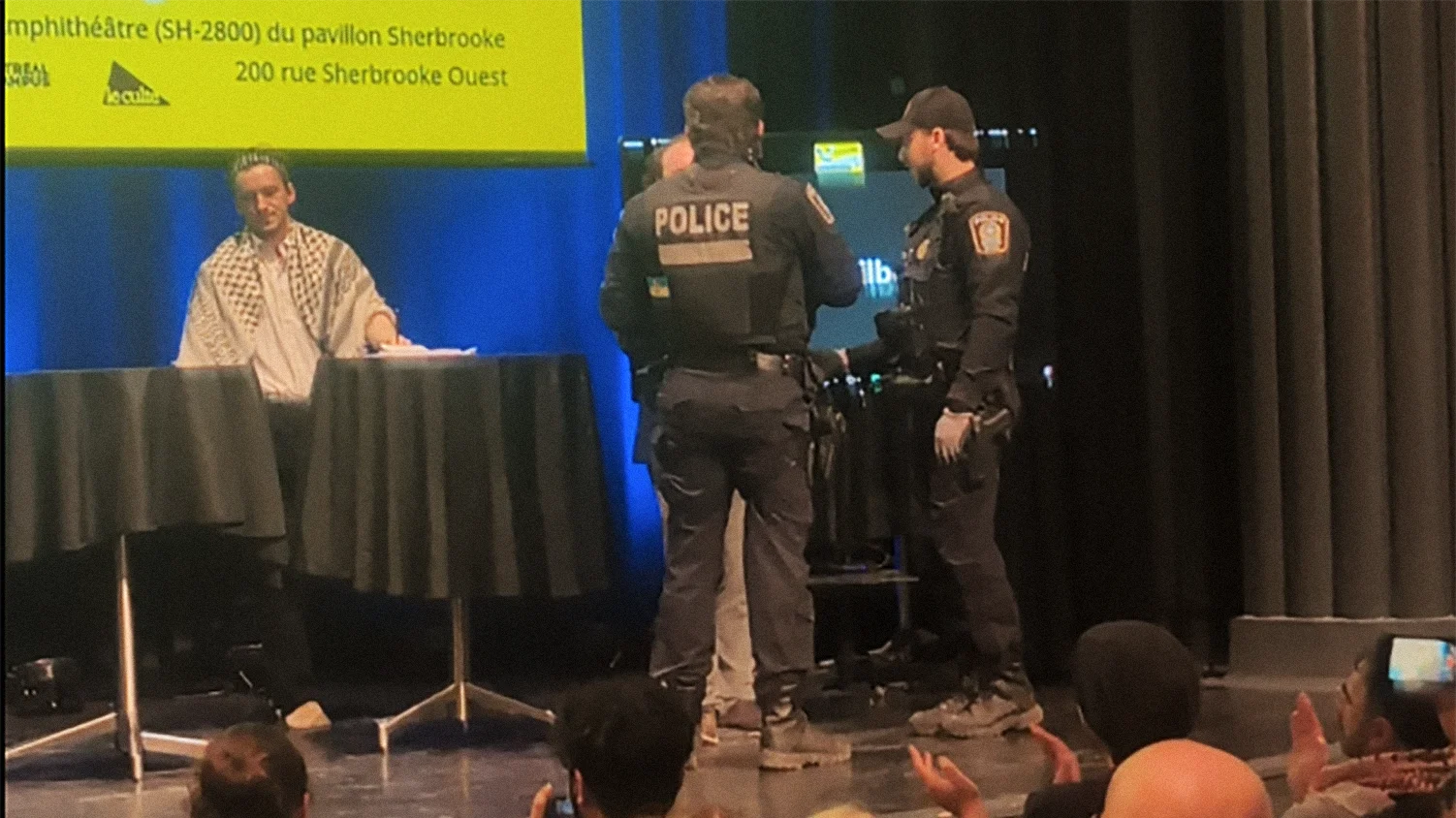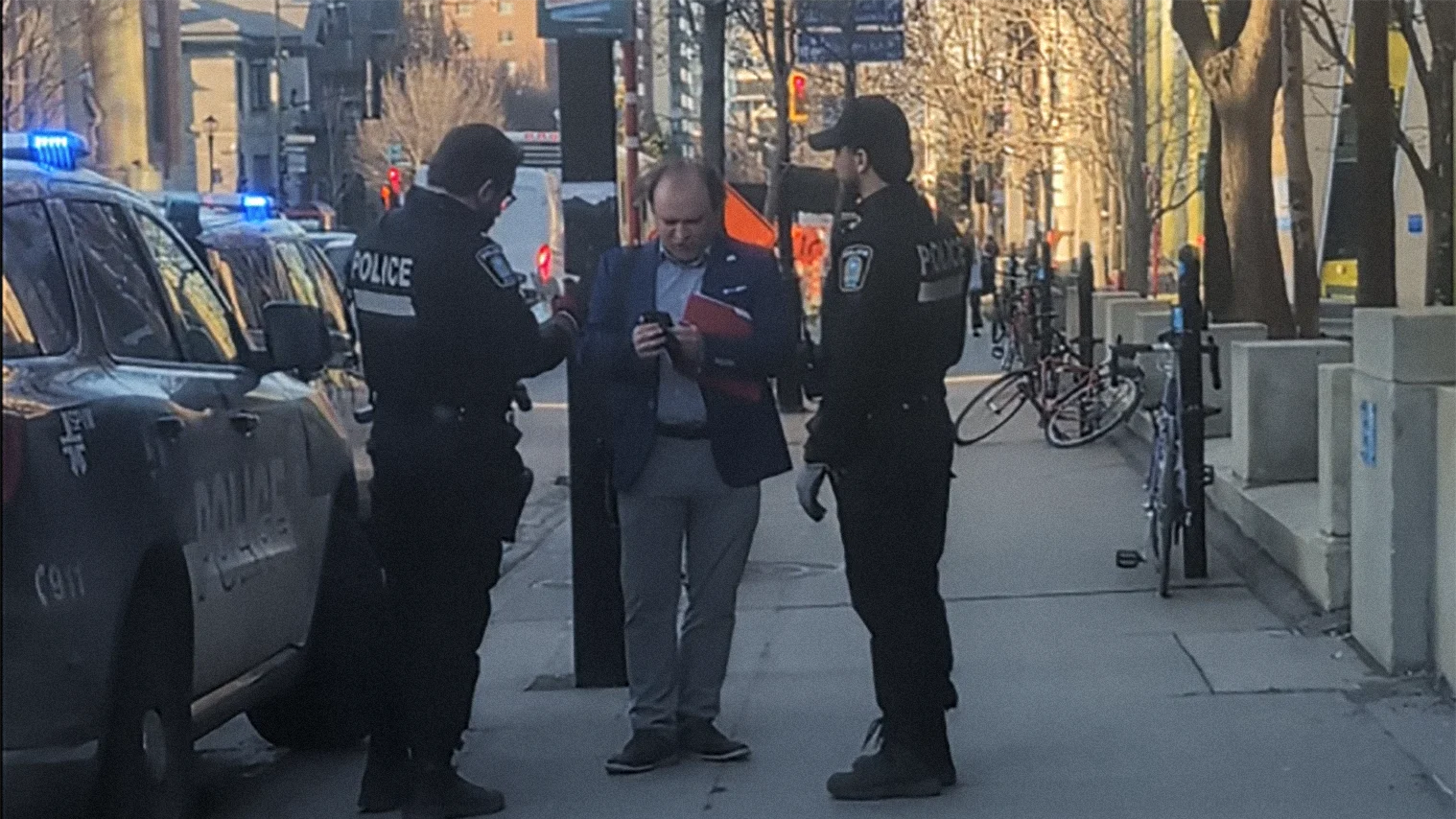Chaos erupted at a local candidates’ debate in Montreal when an excluded candidate stormed the stage to demand the floor and was forcibly removed. This scene took place the day after the Green Party was disinvited at the last minute from the Radio-Canada and CBC debates the day before, unable to satisfy the Leaders’ Debate Commission.
The evening was expected to run smoothly at UQAM’s Sherbrooke Pavilion. After weeks of preparation, the student media coalition organizing the event was ready for their local debate in the Laurier–Sainte-Marie riding. The auditorium was set, the audience was trickling in, and five political parties had been invited: the Bloc Québécois, the Liberals, the Conservatives, the Greens, and the NDP.
Several candidates had been left out by the organizers: two independents, as well as representatives of the People’s Party, the Marxist-Leninist Party, the Communist Party and the Rhinoceros Party. As with most local debates, their absence was taken for granted.
Things got underway about ten minutes late. The organizers thanked everyone and highlighted the effort that went into making the night happen. Then they invited the candidates to take the stage.
But as the guests settled into their seats, the smooth, carefully planned evening suddenly veered off course.
Adrien Welsh, candidate for the Communist Party of Canada in the riding of Laurier–Sainte-Marie, took to the stage, chanting slogans calling for his party to be included in the debate. He was accompanied by a few supporters in the crowd.
The organizers quickly threatened to have Welsh physically removed by security, which is illegal. Candidates and organizers regrouped on stage, looking for a solution.
Jacob Pirro from the Green Party and Nîma Machouf from the NDP offered to share time with Welsh, but the organizers refused. The host gave Welsh an ultimatum: accept three minutes of speaking time, or they would call the police. “Go ahead,” said Welsh, choosing the second option, while some in the crowd were getting impatient and shouting at him to stop.

Police arrived after three minutes and brought Welsh out of the building, threatening to accuse him of public mischief. After law enforcement opened a file on him, no charges followed. Machouf and Pirro, visibly disturbed by this development, left the event. The latter told The North Star that police presence made it impossible to stay in a space meant for open political dialogue.
Welsh told The North Star in an interview the following day: “At the UQAM debate in 2019, I was forced to do the same thing, but they accepted that I could speak. What happened [Thursday] is another level. Having the police enter a university campus is already very heavy with symbolism.”
The debate proceeded with representatives from only three parties present: Liberal, Conservative, and Bloc Québécois. Steven Guilbeault, the incumbent Liberal candidate for Laurier–Sainte-Marie, appeared via Zoom after withdrawing about 30 minutes before the debate. The North Star reporters noticed a Liberal campaign bus parked about 1 km from the venue.
For Jacob Pirro, the incident affirmed that the electoral game is stacked against dissenting political voices:
“My impression is that [the situation] doesn’t reveal much that we didn’t already know: that the status quo and decorum clearly favour the people who are already the most influential, the people who already have the most power,” he remarked. “If the only people who can speak at the microphone are people who are more or less in agreement with the current system, that’s a really dangerous philosophy to keep.”
Small parties like the Communist Party, the Canadian Future Party, the Rhinoceros Party or the United Party of Canada are frequently excluded from debates across the country, both at local level and, of course, when it comes to the leaders’ debates.

Welsh pointed out that, out of 16 registered parties, only four were in the leaders’ debate—proof, he said, of serious barriers to democracy.
“One of the key elements of an election, according to a Supreme Court ruling, is the right to an informed vote,” notes Welsh. “How can the vote be informed if the only time you learn there’s a Communist candidate, an independent candidate, a Rhinoceros candidate, is when you go into the voting booth?”
To join federal leaders’ debates, parties must meet two of three criteria: have an MP, poll at 4%, or run candidates in 90% of ridings. When candidates from smaller parties are unable to participate in even local debates, one wonders how they could ever build enough support to satisfy these criteria on the federal stage.
Pirro underlined the democratic importance of local debates: “Why not just let people talk? The beauty of this kind of debate is that it’s the closest you can get to direct democracy. You can be able to talk directly with the people who intend to represent the people.”


Be part of the conversation!
Only subscribers can comment. Subscribe to The North Star to join the conversation under our articles with our journalists and fellow community members. If you’re already subscribed, log in.